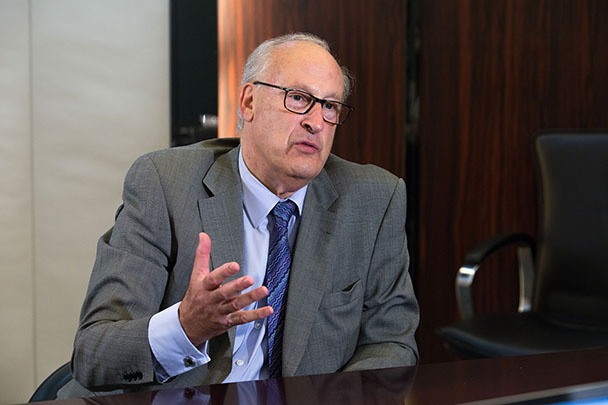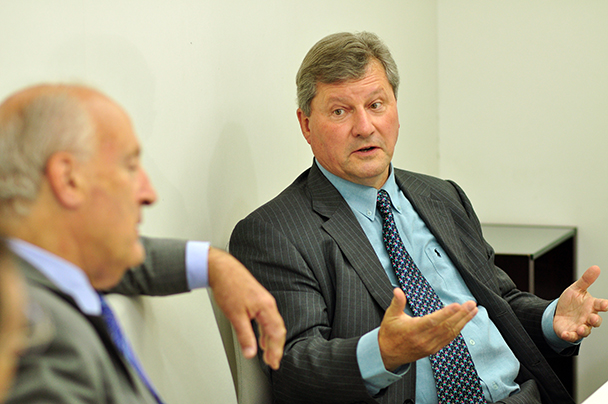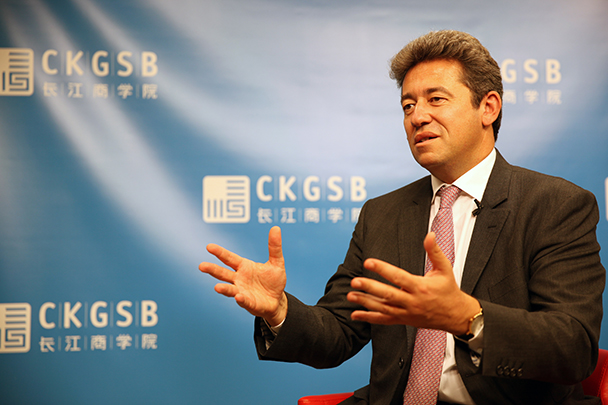The European Union is China’s largest trading partner – for both imports and exports – showing how closely connected China and Europe are today. But as an increasing number of Chinese companies look to expand into Europe, while European firms continue their business dealing in the China, misunderstandings still arise on a regular basis, whether from political, social, cultural or economic issues.
As CKGSB continues its own push to go global and disseminate Chinese management theory, the school’s world-class faculty is complemented perfectly by the European Advisory Board members, who met in Beijing this week to discuss both the challenges and opportunities posed by that expansion.
From L to R: Teng Bingsheng, Sir Victor Blank, Lord Charles Aldington, Charles-Edouard Bouee, James Richards
A day before the board meeting, four of the members held a public panel discussion:
An edited transcript of the discussion, moderated by CKGSB Associate Dean Teng Bingsheng, follows.
CKGSB Professor Teng Bingsheng: Is it possible to use the stock market to jump start an economy?
Sir Victor Blank: The question emphasizes the difference between how most western economies operate versus how China as a state and as an economy operates. “Pump priming” is something that is very rarely used in the West, with 2008 an obvious exception with regard to the banking sector, if not wider industry as whole.

Sir Victor Blank during an interview with Korean media in Beijing on July 9, 2015.
Lord Charles Aldington: Is the stock market an appropriate place for a country’s citizens to invest? If it is, then the stock market would be a part – but not all – of how those citizens spread their savings.
Teng: Will China’s economy affect the rest of the world?
Aldington: The effect will be limited, because of the limited access that the rest of the world has to the Chinese stock market. But if the current stock market slump reflects a real weakness in the economy as a whole, rather than just a market correction, then it’s a different question.
James Richards: The post-Deng Xiaoping development of China is one of the most striking features of the last 30 years. By virtue of its size, China has a huge attraction for global companies and leaders. That has brought a vast, and sudden, change both in China and in its surrounding regions. It has been like the Industrial Revolution in the UK, but on a far greater and quicker scale. That has had wide-reaching effects, with environmental destruction and tensions in the South China Sea tensions among the challenges that China’s rise has brought to the region.
The One Belt, One Road project is not receiving the same amount of attention in the world as it has done in China. It reminds me of the expansion of the Tang dynasty into central Asia, and of the great voyagers from the Ming dynasty. I think this will be positive for China and positive for the world, and will be welcomed, because it will enable trade. As for the AIIB, it was originally seen as a rival by the US, but many other countries feel that there is a great need for this institution and that it can be a real benefit for the region.

James Richards (right) during an interview with Chinese media in Beijing on July 9, 2015.
Teng: How can other countries and foreign companies benefit from the One Belt, One Road project?
Charles-Edouard Bouee: The One Belt One Road project is a very smart way to expand from a domestic market to an international one. I think it is a big reason why many countries joined the AIIB, so that they can have equal opportunities in this development. People from all sides are waiting for the AIIB to start, and are lining up projects, so there will be a lot of opportunities both for China and for others.
Blank: The scope of industry is wider in this regard, but it’s important to recognize the different ways of doing business in different places. Creative industries that are dependent on people and their skills will provide very different investment opportunities for Chinese companies, than just simply buying a piece of real estate.
Teng: I completely agree. What about the example of CKGSB alumni buying vineyards in Europe?
Bouee: Buying a vineyard to acquire skills on how to make wine back home, as opposed to just taking over the running of a French vineyard, can be very useful.

Charles-Edouard Bouee during an interview with CKGSB Knowledge in Beijing on July 9, 2015.
Teng: What do you make of Fosun’s strategy?
Bouee: You need to have a strategy of what you will do with a business, not just buy it because you think it’s cheap. We’ve seen some of each so far with Fosun.
Blank: You might assume that the UK and US have a natural affinity with each other and that M&As between those countries would be no-brainers, but banking and retail examples between those two countries have been universally unsuccessful. My point is that even when the understanding might be there between the two sides, success is far from certain. If Chinese companies buy real estate, or even a vineyard, that’s easy to understand, but if Chinese companies buy a people and skills business, they need to be sure they are able to run it properly.
Aldington: Do you keep the same management team or kick them all out and replace them with your own guys? It’s important to have a plan in place beforehand.
Richards: I would agree with Sir Victor. When I worked at Rolls Royce we had enormous difficulty in taking over a US company. When we look at Chinese companies going out, they often encounter a huge amount of hostility, for example, Chinese workers in Africa make locals feel undermined; Huawei in the UK employed huge numbers of Chinese workers, rather than locals. This can lead to a lot of problems. It’s a learning process and I think China will be successful, but they need to learn quickly.
Teng: There are also examples of locals in France refusing to work overtime or have dinner with their Chinese bosses because of prior commitments. This would be unthinkable in China.
Richards: It’s a two-way business. It’s not just China getting to know the world, it’s the world getting to know China. But it’s a very challenging process.
Bouee: Understanding the local environment is essential: the legal environment could be very laissez-faire, or very restrictive. What is the working culture like? How hard do they work in that country? What is their energy level like? Lastly, what is the spirit of a local country – how do people do business there? You need to learn their history, so you get a better understanding of what life is like there and how the people think and behave.
Aldington: I think we’re being a bit negative here about overseas investment. The point is not to complain about challenges and obstacles, but to see them as simple issues and then find solutions. The first question is to ask yourself is “Why are you buying this?”

Lord Charles Aldington during an interview with Korean media in Beijing on July 9, 2015.
[A discussion followed with members of the audience about different social attitudes in Europe and China and in particular the balance between hard work and overworking].
Question from audience member: What is the attitude towards Chinese M&As in Europe?
Aldington: I can speak from a UK and German perspective and both places view Chinese investment as very welcome.
Teng: What about real estate prices being pushed up and other knock-on effects?
Richards: It’s not just Chinese investment, but there are also other speculators. The UK has welcomed Chinese investment. For example, Chinese investment into the nuclear sector has been welcomed in a way that UK investment would not be welcomed into the Chinese nuclear sector, because it’s considered very sensitive here.
Current MBA student Kamil Kmec asks a question to the panel during an event in Beijing on July 9, 2015.
Question from audience member: Will Europe invest in China in the next 5-10 years?
Blank: Investing in China is not risk-free, there can be political interference and other obstacles, but for [Blank’s current company] TPG it’s been a successful strategy. You don’t say “there are problems, don’t invest”, you say “there are problems, how can we mitigate those problems?” China is not as open as some other countries, but it’s a still an attractive market, so you evaluate all the pros and cons, and then make a decision based on that.
Bouee: The Chinese market has become more difficult, because in the past anyone could win. What has changed is the increased competition from Chinese players, which is a great thing, the costs are doing business have increased, the digital space in China is very advanced and it’s disrupting most of the MNCs here because they don’t know how to handle this. They have to be at the forefront of digital, otherwise they get wiped out. But China is often the number 1 or 2 biggest market for many of these companies, so these are big issues for them.